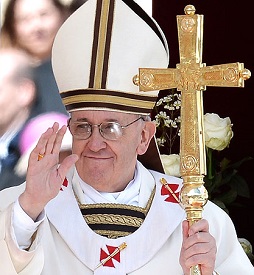 |
| POPE Francis: Qualified. |
So what should you do in the meantime to get ready for the role? Some popes were laymen (I should note: Being male improves your chances for election considerably, notwithstanding the long-held legendary attraction of Pope Joan), but the vast majority were ordained. So priesthood is a plus, topped off with a wonderful Roman education at a pontifical institute of learning, a high-level job in one of the offices of the Curia, the Vatican bureaucracy, and doing time in highly visible diocesan chanceries in large cities. Attaining the status of bishop and cardinal tremendously increases your odds even though it’s not required by church law.
Medieval and renaissance popes had the advantages of coming from princely or aristocratic Roman families, but never mind if you don’t have a fine pedigree. Sixtus V was the son of a laundress, and Pius X the child of a seamstress. A few popes were renowned preachers, like the Franciscan Sixtus IV, and others were learned as lawyers, professors, and poets. But as many had their beginnings as monks, anchorites, even a hermit—though that latter didn’t work out so well when Celestine V, elected against his will at age 85 in 1294, abdicated after six months to return to his hermitage.
In centuries past it was helpful to know how to organize a crusade or at least to command an army, though that’s no longer a particularly useful papal skill. In the 10th century being wicked wasn’t a deal-breaker, but most popes have been well-meaning men and more than a few were martyred or popularly acclaimed as saints.
Scripture
• On skills needed for leadership: Matthew 18:1-5; Mark 8:34-36; 9:33-37; 10:42-45; Luke 22:24-30; Ephesians 4:11-16; 1 Timothy 3:1-7
Online
• "24 popes, some good, in years leading up to first millennium" by Joseph Gallagher, National Catholic Reporter, 3/17/95
Books
• By Eamon Duffy: Saints and Sinners: A History of the Popes and Ten Popes Who Shook the World (both from Yale University Press)



